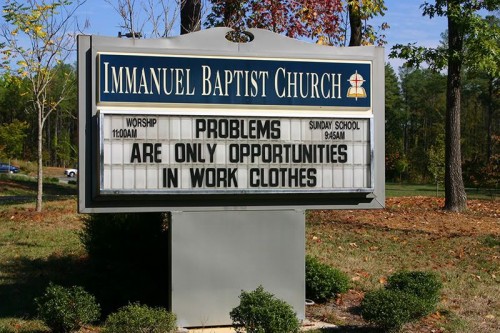
1. Next week, Harvard psychologist Joshua Greene is slated to release a new book on behavioral morality, examining the everyday irrationalities and subconscious biases that Kahneman, Tversky and company have popularized over the last few decades (aside: are all titles/covers copying Malcolm Gladwell?). A common behavioral problem, the “trolley experiment”, asks people to make a hypothetical decision: if a train cannot brake and is about to run over five people, would you pull a lever that would divert it, but cause it to hit one other person? Many people answer ‘yes’. But take the same scenario, and now you have to push someone off a bridge in front of the train to save five people – and many more people answer ‘no’ in this scenario. The discrepancy gives evidence that our morality is not as rational as we’d like to suppose; it’s motivated by an aversion to moral responsibility, the need to avoid guilt, etc.
As much as we love these experiments confirming/exploring what some would call a pessimistic anthropology, alas, sometimes we’re tempted to treat our diagnostic ability as evidence of a cure. Over at The Atlantic, Robert Wright accuses Greene of doing just this, and it’s fascinating how behavioral psychologists – among the most astute students of human nature – can’t always escape the self-optimism and general naïveté which wires us all:
This fact—that different groups view life “from very different moral perspectives”—is what Greene calls the “Tragedy of Commonsense Morality.” He opens his book with a parable in which different tribes subscribing to different values can’t get along and says, “They fight not because they are fundamentally selfish but because they have incompatible visions of what a moral society should be.”
If this diversity of moral codes is indeed the big problem, one solution suggests itself: get rid of the diversity. We need “a common currency, a unified system for weighing values,” Greene writes. “What we lack, I think, is a coherent global moral philosophy, one that can resolve disagreements among competing moral tribes.” He is proposing nothing less than the moral equivalent of Esperanto…
I think the big problem comes earlier, in the diagnosis phase, and it’s a problem common in analyses of the world’s conflicts: overestimating the role played by divergent values…
If real-world examples of our self-serving biases seem hard to find, that’s because they’re supposed to be hard to find; the whole idea is that we’re not aware of the information these biases exclude. So, for example, if you’re like the average American, here’s a fact you don’t know: in 1953, the United States sponsored a coup in Iran, overthrowing a democratically elected government and installing a brutally repressive regime that ruled for decades. Iranians, on the other hand, are very aware of this, which helps explain why, to this day, many of them are gravely suspicious of American intentions. It also helps explain the 1979 takeover of the U.S. Embassy in Tehran—an event that many Americans no doubt chalk up to unfathomable religious zealotry. This is the way the brain works: you forget your sins (or never recognize them in the first place) and remember your grievances…
But however dark the view of human nature that inspired this mission, I fear it’s not dark enough. If Greene thinks that getting people to couch their moral arguments in a highly reasonable language will make them highly reasonable, I think he’s underestimating the cleverness and ruthlessness with which our inner animals pursue natural selection’s agenda. We seem designed to twist moral discourse—whatever language it’s framed in—to selfish or tribal ends, and to remain conveniently unaware of the twisting.
Not much to add to that, except to say my favorite part of the whole article comes toward the end, when Wright uses our blindness to our own biases (c. Mt 7:3) as evidence that these insights’ ‘application’ is first and foremost to distrust oneself: “But if psychology tells us anything, it is to be suspicious of the intuition that the other guys are the problem and we’re not.” A more traditional way of phrasing that suspicion would be ‘confession’ or ‘repentance’…. and we learn a lot about the shape of that introspection, as opposed to suspecting others or covering over our problems with ‘progress‘, in guys like Wright.
2. In an excellent editorial piece at Christianity Today, Mark Galli asks, “What Ever Happened to Grace?” It’s a succinct and articulate summary of the different ways we see Christianity twisted in the Church today, more often than not by means of somehow removing grace from center stage. A couple of examples:
I was at [a] church where the message was grounded in those astounding and miraculous verses that culminate in “I have been crucified with Christ. It is no longer I who live, but Christ who lives in me. And the life I now live in the flesh I live by faith in the Son of God, who loved me and gave himself for me” (Gal. 2:20, ESV). Things were going well until we got to the end, when the preacher said, “Have you experienced grace?” His tone, and the background music that swelled as he prayed, suggested we were not saved by faith in what Christ accomplished but by a certain type of religious feeling we might have…
I was speaking with a professor at a Christian university, and we were talking about the relationship of grace and good works. At one point he said, “We are saved by grace, yes, but after that, the Christian life is mostly about our effort to live a Christlike life.”
These two examples are dismissible in terms of theology, but at the emotional level – well, less so. It’s reasonable to assume that the most grace-focused people still put pressure on themselves to understand the message or to feel it, making it into a new Law, a new technique. I certainly do. I think again of von Balthasar’s warning:
For when a doctrine (first in the master, then in the disciple) becomes a technique, there is present a self-destroying paradox: intentional effort is exercised to achieve the repression of all intention, which, with or without a teacher, amounts to a self-motivated storming of the realm of grace.
Maybe in the context of a grace-theology, ‘technique’ looks like the effort trying to live a life of feeling more dependent on God, or trying to be less controlling, or trying to be a little less intentional, to use von Balthasar’s phraseology. Back to Galli:
What I’m hearing time and again, in every corner of the church I visit, is not the soaring message of grace but the dull message of works—that I have to believe a certain theological construct, or have a certain feeling, or perspire in effort before I can be assured of God’s radical acceptance and my future salvation….
There was once miraculous talk of the impossible possibility that a way had been made to return to Eden. And the angel standing at the entrance did not demand intellectual or emotional or moral visas to get in. The only passport required was one with a full list of all our sins, each stamped over, blotted out really, with the red ink of grace.
http://www.youtube.com/watch?feature=player_detailpage&v=r75BFcH4u2k&w=600
3. Arcade Fire’s new album, Reflektor, is out today! Rolling Stone posted an interview with Arcade Fire about the album, which was supposed to be released early next week, but has been posted online (by the band) here. Some highlights from the interview:
On the last record you were singing a little bit about the parents’ perspective. What do you think the songs have in common?
I studied the Bible and philosophy in college and I think in a certain sense that’s the kind of stuff that still makes my brain work. There’s an essay by Kierkegaard called The Present Age that I was reading a lot that’s about the reflective age. This is like in [1846], and it sounds like he’s talking about modern times. He’s talking about the press and alienation, and you kind of read it and you’re like, “Dude, you have no idea how insane it’s gonna get.” [Laughs.]
What about Kierkegaard’s essay did you find relevant?
It reads like it was written here, basically. He basically compares the reflective age to a passionate age. Like, if there was a piece of gold out on thin ice, in a passionate age, if someone went to try and get the gold, everyone would cheer them on and be like, “Go for it! Yeah you can do it!” And in a reflective age, if someone tried to walk out on the thin ice, everyone would criticize them and say, “What an idiot! I can’t believe you’re going out on the ice to try and risk something.” So it would kind of paralyze you to even act basically, and it just kind of resonated with me — wanting to try and make something in the world instead of just talking about things.
4. Francis Spufford continues to amaze. Following this month’s US release of his book Unapologetic, a brilliantly-written emotional defense of Christianity, John Williams of the New York Times did an excellent interview with Spufford who is, to my mind, one of the most eloquent Christian voices today, as well as an excellent experiment in public credibility for Christianity:
Q. Did the biggest inspiration to write this book come from the outspoken atheism of writers like Richard Dawkins and Christopher Hitchens?
A. Not in the sense that I thought they made a case that deserved arguing with directly. “The God Delusion,” “God Is Not Great,” etc., are (as they say) not even wrong. They treat Christianity either as a bunch of mock-scientific propositions about the universe which you can disprove, or as a social phenomenon which you can treat as entirely malign if you squint at it and wave your arms a lot. In both cases they operate a million naïve miles away from the actual experience of belief.
However they did also piss me off (as we like to say in the Church of England). I certainly wanted to write something back that had equal polemical snap, crackle and pop, just in case anyone felt like buying the lazy assumption that the atheist side of the quarrel was the clever one….
Christianity pops bubbles. Its power lies in its realism. It acknowledges suffering, squalor and cruelty, including the suffering and squalor and cruelty caused by us Christians ourselves and our churches; it demands that we give those things their full weight of sorrow and culpability, and only then does it insist that the story isn’t over, that there is more to say. After Good Friday comes Easter Sunday. But you can’t fast forward through the ugliness. Clergy child abuse, zealous violence, homophobia, anti-Semitism: they’re all to be confessed, not excused. Whether people forgive us for them is up to them. We don’t get to demand forgiveness, or to hurry the conversation along to things we’re prouder of.
Q. In describing a feeling of deep concentration in a church, you write: “I’ve been made unfamiliar to myself, and therefore hopeful.” Can you explain why that makes you “hopeful”? I can imagine a feeling of unfamiliarity to one’s self could be disorienting or even terrifying instead.
A. It depends what you’re feeling to begin with, doesn’t it? If you’re basically happy, then to be alienated from that is, yes, disturbing, even frightening. (And may all the same be valuable, opening up a cranny through which leaks a doubt that enables growth.) But if you’re miserable, and your familiarity with yourself is a weary resignation, alienation can be enlargement: a gift of new space, a door opening where you didn’t know there was one.
If you haven’t yet read the book, run don’t walk, and be sure too to check out Spufford’s fantastic Mockingbird interview from last week, where he goes pretty deep into his re-presentation of Christ in his ‘Yeshua’ chapter.
5. It’s been a good week for social science. In addition to the Joshua Greene piece above, two more were eye-catching: one, from an economist writing for the New York Times about why we make bad decisions, and another from Scientific American, exploring the social impulses we have as humans:
…because of how social pain and pleasure are wired into our operating system, these are motivational ends in and of themselves. We don’t focus on being connected solely in order to extract money and other resources from people – being connected needs no ulterior motive.
This has major consequences for how we think about structuring our organizations and institutions. At businesses worldwide, pay for performance is just about the only incentive used to motivate employees. However, praise and an environment free from social threats are also powerful motivators. Because social pain and pleasure haven’t been a part of our theory of “who we are” we tend not to use these social motivators as much as we could.
6. Also from The New York Times, there’s a fascinating look at one aspect of the Ernest Hemingway legacy we don’t hear much of: the reaction against the family’s history of mental illness. The Times profiled the writer’s granddaughter, Mariel, and her host of health and wellness theories to keep depression and anxiety at bay, including walking barefoot to absorb minerals and watching the sunrise as therapy for immune system. It’s well-worth a read; Mariel’s lifestyle, at first glance, makes her seem almost like one of her grandfather’s characters – repressed, fearful of the dark side of her psyche, taking refuge in hyper-controlled habits, a la Nick from In Our Time. And yet, while the wellness obsession is dubiously new-agey, the writer breaks through to a somewhat beautiful story of the daughter of a ‘cursed’ family finding actual peace, and happiness; he joins Woody Allen in expressing unqualified admiration for her. It’s a story first about reaction, but then repentance, and well-worth a read.
7. Also in culture, The A.V Club compiled a brilliant list of “10 anxiety-reflecting Simpsons Halloween segments“. For example, consider last year’s Tree House of Horror XXIII, which takes the Mayan calendar pretty closely at its word concerning the end of time:
An addition to the “Treehouse Of Horror” canon that indulges the series’ taste for the grotesque more than its verve for a good scare, the intro fingers Homer’s cowardly non-union Mayan equivalent as the cause for the pending end of days, his refusal to spill his own blood exposing the planet to the wrath of the Mayan gods several centuries later….
8. And for more culture links: much-loved poet Billy Collins released a new collection this week, called Aimless Love; The Atlantic reposts one of Flannery O’Connor’s unpublished stories, entitled “The Barber”; at The New Yorker, the merits of C.S. Lewis’s Screwtape Letters are reconsidered; and finally, an editor for AMC’s Breaking Bad pays tribute to the hit show on ice:
Also, we’re happy to announce a new podcast from our friends over at Liberate, which we heartily recommend along with our sermon podcast, The Mockingbpulpit.
http://www.youtube.com/watch?feature=player_embedded&v=CBjqUEMlHTY&w=600

COMMENTS
One response to “Another Week Ends: Tribal Morality, Passports to Eden, Reflektor, Spufford in the Times, Social Wiring, Hemingway’s Granddaughter, Anxious Simpsons, and Heisenberg on Ice”
Leave a Reply


















Reading Galli’s piece: a colleague (and mentor) once commented about a lectionary interpreter. That “sometimes he lacks confidence in grace.” One might suggest that as a Lutheran, I have been taught to suspect this of EVERYONE.
We all lack confidence in grace.
Yet Galli puts his finger on one of the prime problems of American theology. That is how so many make this lack of confidence, not something to critique, but a part of their confession.
The reformers named this mistaking the law for the Gospel.
Happens all the time